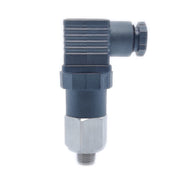While pressure sensors in automotive fuel systems are generally reliable, there are a few common issues that can arise:
Electrical Problems: Pressure sensors rely on an electrical signal to communicate with the engine control module. If there is an issue with the wiring or connections between the pressure sensor and the ECM, the sensor may not function properly.
Calibration Issues: Pressure sensors need to be calibrated correctly in order to provide accurate measurements. If the sensor is not calibrated properly, it may provide inaccurate readings, which can lead to engine performance issues.
Contamination: Fuel systems can sometimes become contaminated with dirt, debris, or other particles. If these particles get into the pressure sensor, they can cause it to malfunction or provide inaccurate readings.
Wear and Tear: Pressure sensors are subject to wear and tear over time, especially if they are exposed to extreme temperatures, vibration, or shock. This can cause the sensor to fail or provide inaccurate readings.
Clogging: Fuel lines and filters can become clogged with debris over time, which can cause fuel pressure to drop. This can put additional strain on the pressure sensor, causing it to malfunction or fail.
To avoid these issues, it is important to properly maintain and inspect your vehicle's fuel system and pressure sensors. Regular cleaning and replacement of filters and fuel lines can help to prevent contamination and clogging, while proper calibration and electrical connections can ensure accurate readings from the pressure sensor.



Leave a comment